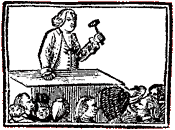How He Made Himself So Important
 One of the more curious curios of pre-Revolutionary Boston is a broadside titled “The CONVERSATION of two Persons under a Window on Monday Evening the 23d of March.” The dialogue that follows is about a town meeting, which indicates the date of the printing: the only year when Bostonians met on Monday, 23 March, was 1767.
One of the more curious curios of pre-Revolutionary Boston is a broadside titled “The CONVERSATION of two Persons under a Window on Monday Evening the 23d of March.” The dialogue that follows is about a town meeting, which indicates the date of the printing: the only year when Bostonians met on Monday, 23 March, was 1767.
The dialogue focuses on a politician referred to as “Pug Sly.” One surviving copy of this broadside has a handwritten note identifying that character as Royall Tyler—not the playwright, novelist, and jurist who took that name as he came of age, but his father. The senior Royall Tyler held several respected offices in Boston, including Fireward, Overseer of the Poor, and Representative to the General Court. By 1767 he was being elected each year to the Governor’s Council, where he was one of the more radical Whig voices.
The broadside describes how “Pug Sly” built his political popularity. It’s obviously a hostile portrait, but also some of our best evidence about how politicians won elections in this period when they weren’t supposed to openly campaign. One of the broadside’s voices says:
When quite young, how did he work himself into the Corcas; and was knowing to all their transactions: and whenever he found there was to be a change of [town] officers, he would as a fawning sycophant, let them know they were to be chose in office; so as to take the merit of it to himself: that some was made to believe that “PUG’s interest alone was all the Town.”As this election year proceds, I’ll quote more political advice attributed to “Pug Sly” and the elder Royall Tyler.
And every one that did not sacrifice to him, he would (to use his own word) give them a trip: and at this game there is not his equal. His thirst for honor, has put him upon the most dirty actions that a reasonable being is capable of:
I once ask’d him how he made himself so important. “Why, says he, I’ll tell you. To some I cry: some I coax: to some I scold: and put on an important appearance of friendship to all. As to the mechanicks; I take my rounds, turn in about eleven o’clock; and mix in with the conversation, and nothing will take them fellows in like it. When there is to be an engine supper [i.e., banquet of a volunteer firefighting company], I lay a plan to be invited; and they fix me at the head of the table, and pay me as much homage as a demi-god: You would sometimes laugh your soul out, if you was to see how I work them poor toads.
[“]As to those in higher life, I put on a sabbady [serious, Sabbath-Day] face; frequently apply to them for advice; sometimes upon affairs of great importance. I suppose (now under the rose) I have been to fifty, to ask advice about making my will. I have taken my pipe in the evening, collected the neighbours, set an affair on foot only to see how far I could carry it; and when I have got it to the pitch I wanted it, then I lower’d, and set it down just where I found it.”

No comments:
Post a Comment